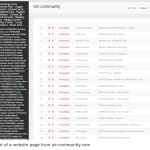What is a strong password?
A strong password is a minimum of 8 characters long, does not contain your user name, any real name, company name or a complete word. It includes uppercase letters, lowercase letters, and symbols or numbers.
Symbols found on the keyboard (i.e. all keyboard characters not defined as letters or numerals) and spaces are:
` ~ ! @ # $ % ^ & * ( ) _ – + = { } [ ] \ | : ; ” ‘ < > , ..
A password might meet all the criteria above and still be a weak password. For example, Hello2U! meets all the criteria for a strong password listed above, but is still weak because it contains a complete word. H3ll0 2 U! is a stronger alternative because it replaces some of the letters in the complete word with numbers and also includes spaces (these are okay to use).
Substitute numbers, symbols, and misspellings for letters or words in an easy-to-remember phrase. For example, My son’s birthdate is 09 December, 2001 could become Mi$un’sBrthd8iz091201.
An easier to remember (and more fun) method is to take the first letter of each word from part of a song you like. For example, Madonna’s “When you call my name it’s like a little prayer” and turn it into the password wuCmNilaLP!
It should go without saying that if you feel you must write down your password in order to remember it, make sure you don’t label it as your password. Also remember to keep it in a safe place!
FACT: 73% of users have the same password for multiple sites and 33% use the same password every time.
It is also extremely unwise to use the same password for multiple sites, or have just one password that is used everywhere. That’s because in the event of a security breach, such as the Heartbleed Bug, you’ll have to change your password on every website you use. It’s so easy for a spammer who has your password to try it out on other sites they think you might have used.
Remember: create unique passwords for every website you use. If you don’t do that, hackers can piece together the patterns you use for creating your passwords. Then they’ll basically have the ‘key’ to all your accounts.
August 2017: Please see updated advice on creating strong passwords






